If the story is true, this tasty seafood stew goes back to a down-on-his-luck fisherman with an empty pot and some good friends.
Cioppino is a hearty seafood stew that originated in San Francisco in the 1850s and is closely associated with the city. The dish is believed to have been developed by Italian immigrant fishermen, mostly from the port city of Genoa, Italy, who lived in North Beach and fished off Meiggs Wharf. Meiggs Wharf was destroyed during the great earthquake in 1906 and when rebuilt, became known as "Fisherman's Wharf."
The story goes that if a fisherman returned from a day of fishing, empty-handed, he would walk around with an empty pot and ask other fishermen to contribute whatever seafood they could. This became his "cioppino" and the ingredients for his dinner that night. All who contributed expected the same generosity if they came in empty handed in the future. The dish later became a staple in Italian restaurants around San Francisco. The name "cioppino" may come from the Italian word for "chip in".
Cioppino is made up of two components: a seasoned seafood mixture and a tomato-based sauce, which are prepared separately and then combined just before serving. The dish typically includes seafood like clams, crab, fish, and shrimp, along with wine, onions, herbs, and tomatoes.
The earliest known description of cioppino is from a 1901 recipe printed in The San Francisco Call under the name "chespini". The word "cioppino" first appeared in The Refugee's Cookbook in 1906, a fundraising effort for San Franciscans displaced by the earthquake and fire that destroyed Meiggs Wharf and led to the creation of Fisherman's Wharf. The cookbook included a recipe for cioppino, which may have been the first time San Franciscans could buy a cookbook with an official recipe for the dish.
Cioppino became a staple at Italian restaurants in San Francisco, and today it's synonymous with the city especially the wharf area. San Francisco restaurants like Alioto's, Sotto Mare, and The Clam House are known for their cioppino.
Here is how I make this famous San Francisco Fisherman's Stew:
Cioppino
Ingredients:
Cioppino Stock
2 Tablespoons olive oil
2 Tablespoons butter
1/2 cup onions, medium dice
1/4 cup green bell peppers, medium
dice
1/4 cup red sweet peppers, medium diced
1/4 cup celery, medium dice
1 14 oz can tomatoes, crushed and drained,
liquid reserved
1 Tablespoon tomato paste
1 teaspoon
anchovy paste
1 8 ounce can tomato sauce
2 teaspoons minced
garlic
8 ounces Clam juice
1 cup chicken stock
1 cup water (as needed)
2 teaspoons garlic salt
1 teaspoon
salt
1 teaspoon black pepper
1 Tablespoon Bacon Fat
1/2 Tablespoon oregano, dried
3
Tablespoons Paprika
1 teaspoon red pepper flakes
1 Tablespoon basil
1 Teaspoon thyme, dried
1/4 cup
parsley leaves
1/2 teaspoon ground bay leaves
1 teaspoon red cayenne
pepper
Directions:
Add onions, green pepper, sweet peppers, celery and garlic to the pot that will be used to gook the cioppino and sauté in butter and olive oil until soft.
Add spices, remaining ingredients, chicken stock, clam juice and 1/2 cup water.
Bring to a boil. When the stock begins boiling, reduce heat immediately to a simmer. Cover and simmer at least 1 hour, stirring frequently. Drain canned clams and add the liquid to the stock while cooking.
Add additional chicken stock or water as needed to make a stock. I like mine thick but thinner is also nice if you like yours thin. This stock can be made a day ahead of time and refrigerated if desired.
Making the Cioppino
1 pound shrimp, 21-25 count, peeled and
deveined
3 large sea scallops, cubed
1/2
pound redfish cubed
1 10 ounce can clams, with juice
1/2 cup dry white wine
Prepared cioppino stock
Toasted French bread
Add the seafood to the stock, add white wine, and cook at a low simmer for 30 minutes.
Serve with toasted, buttered French bread and a dry white wine.
Thanks for looking at my post.
God
bless you.







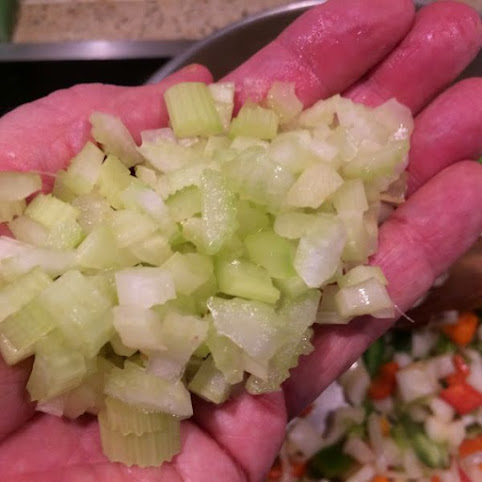















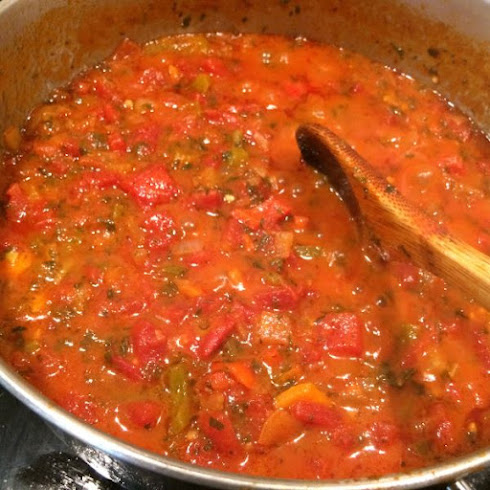



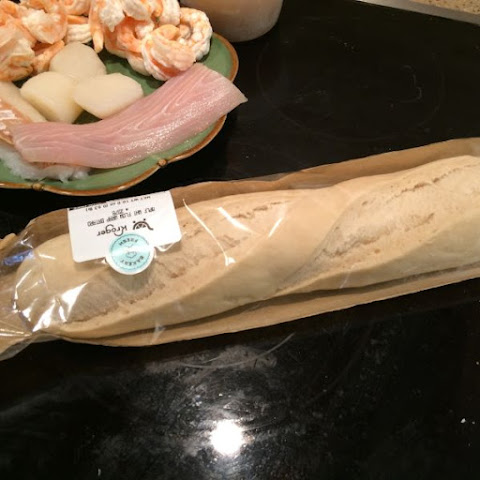


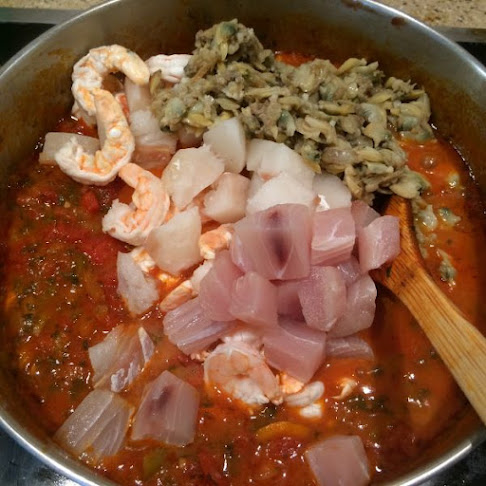





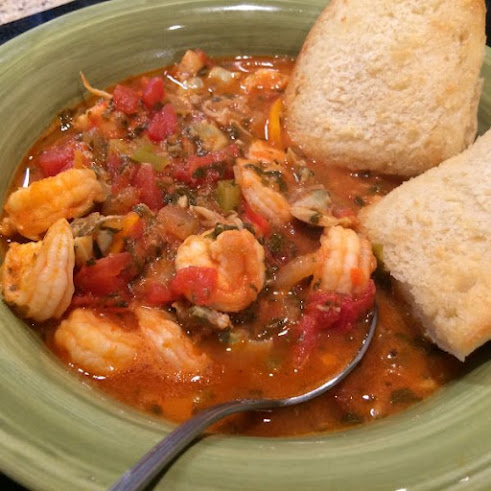
























5 comments:
Dang you KF, now I'm very hungry and lunch is hours away!
Sounds great! One tip: The small bay scallops might be a better choice than dicing sea scallops - the price should be considerably less, probably be easier to find for many folks, and most won't notice a difference in this recipe.
Boulliabase traditional French fish stew with saffron. Check it out
"I'm just wild about Saffron and Saffron's wild about me."
Love it.
Do any metro restaurants serve it?
Post a Comment